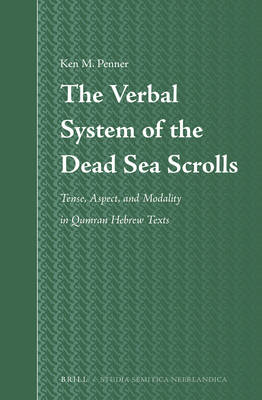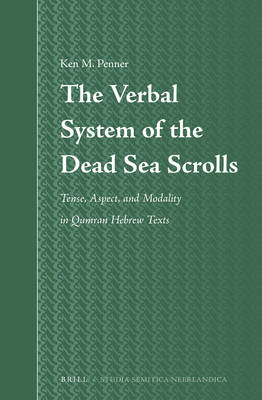
- Afhalen na 1 uur in een winkel met voorraad
- Gratis thuislevering in België vanaf € 30
- Ruim aanbod met 7 miljoen producten
- Afhalen na 1 uur in een winkel met voorraad
- Gratis thuislevering in België vanaf € 30
- Ruim aanbod met 7 miljoen producten
Zoeken
The Verbal System of the Dead Sea Scrolls
Tense, Aspect, and Modality in Qumran Hebrew Texts
Ken M Penner
€ 210,95
+ 421 punten
Omschrijving
In The Verbal System of the Dead Sea Scrolls Ken M. Penner determines whether Qumran Hebrew finite verbs are primarily temporal, aspectual, or modal.
Standard grammars claim Hebrew was aspect-prominent in the Bible, and tense-prominent in the Mishnah. But the semantic value of the verb forms in the intervening period in which the Dead Sea Scrolls were written has remained controversial.
Penner answers the question of Qumran Hebrew verb form semantics using an empirical method: a database calculating the correlation between each form and each function, establishing that the ancient author's selection of verb form is determined not by aspect, but by tense or modality. Penner then applies these findings to controversial interpretations of three Qumran texts.
Standard grammars claim Hebrew was aspect-prominent in the Bible, and tense-prominent in the Mishnah. But the semantic value of the verb forms in the intervening period in which the Dead Sea Scrolls were written has remained controversial.
Penner answers the question of Qumran Hebrew verb form semantics using an empirical method: a database calculating the correlation between each form and each function, establishing that the ancient author's selection of verb form is determined not by aspect, but by tense or modality. Penner then applies these findings to controversial interpretations of three Qumran texts.
Specificaties
Betrokkenen
- Auteur(s):
- Uitgeverij:
Inhoud
- Aantal bladzijden:
- 240
- Taal:
- Engels
- Reeks:
- Reeksnummer:
- nr. 64
Eigenschappen
- Productcode (EAN):
- 9789004298439
- Verschijningsdatum:
- 7/08/2015
- Uitvoering:
- Hardcover
- Formaat:
- Genaaid
- Afmetingen:
- 157 mm x 241 mm
- Gewicht:
- 498 g

Alleen bij Standaard Boekhandel
+ 421 punten op je klantenkaart van Standaard Boekhandel
Beoordelingen
We publiceren alleen reviews die voldoen aan de voorwaarden voor reviews. Bekijk onze voorwaarden voor reviews.











